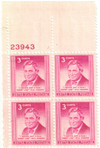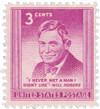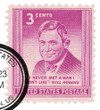
# 975 - 1948 3c Will Rogers
Birth of Will Rogers
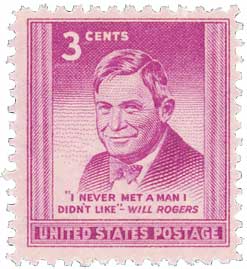
William Penn Adair Rogers was born on November 4, 1879, in Oologah, Cherokee Nation (present-day Oklahoma).
Rogers’ parents, Clement Vann Rogers and Mary Schrimsher, were both part Cherokee Indian. Rogers loved cowboys and horses and learned to ride and rope at a young age, earning a place in the Guinness Book of World Records for throwing three lassos at one time.
In 1901, Rogers and a friend traveled to Argentina hoping to find work as gauchos on a cattle ranch. When they failed to find work and lost all their money, they parted ways. Rogers then went to South Africa where he worked on a ranch before joining Texas Jack’s Wild West Circus.
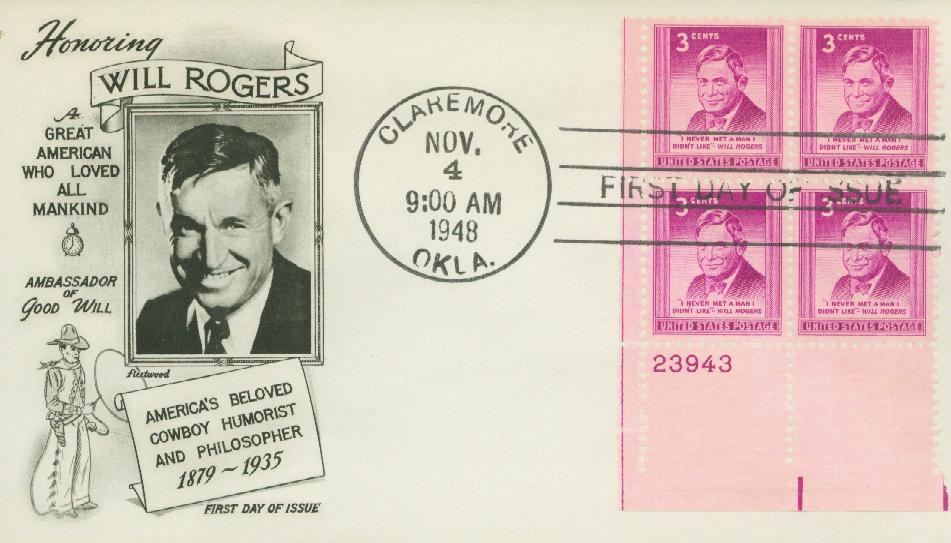
Rogers became a true showman during his time with Texas Jack. While Rogers created a roping and riding act, he learned a great deal about performing from Texas Jack, including what he thought was the secret to show business – leaving the stage early so the crowd would want more.
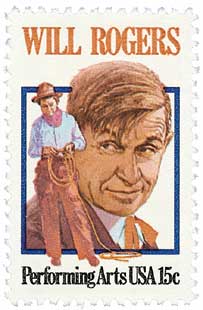
While Rogers enjoyed his time with Texas Jack, he was anxious to keep moving, so he traveled to Australia and joined the Wirth Brothers Circus. He continued to do his riding and roping and worked on a pony act. Rogers then returned to America in 1904, performing at the St. Louis World’s Fair. From there he got into vaudeville. During a performance in New York City, Rogers roped a steer that had broken free and climbed into the viewing stand. The story became front-page news, helping to make him more famous. He worked in vaudeville for the next 10 years. During this time he married and fathered four children, one of whom would become a World War II hero and later play his father in two movies.
In 1915, Rogers began performing in Florenz Ziegfeld’s Midnight Frolic. Rogers would take the stage in his cowboy outfit, twirling his lasso, and say, “Well, what shall I talk about? I ain’t got anything funny to say. All I know is what I read in the papers.” He’d then tell jokes about the news. His popularity earned him a spot at the Ziegfeld Follies, where Rogers did daring rides and lasso tricks. He also continued to fine-tune his satire, “roasting” Woodrow Wilson’s policies when the president attended one of his performances.
Rogers got into silent films in 1918 when he appeared in Laughing Bill Hyde. He moved west for a three-year Hollywood contract and also set up his own production company. Rogers enjoyed this, but silent films couldn’t capture the best part of his act. He did write a lot of the title cards for the films he appeared in, though.
Birth of Will Rogers

William Penn Adair Rogers was born on November 4, 1879, in Oologah, Cherokee Nation (present-day Oklahoma).
Rogers’ parents, Clement Vann Rogers and Mary Schrimsher, were both part Cherokee Indian. Rogers loved cowboys and horses and learned to ride and rope at a young age, earning a place in the Guinness Book of World Records for throwing three lassos at one time.
In 1901, Rogers and a friend traveled to Argentina hoping to find work as gauchos on a cattle ranch. When they failed to find work and lost all their money, they parted ways. Rogers then went to South Africa where he worked on a ranch before joining Texas Jack’s Wild West Circus.

Rogers became a true showman during his time with Texas Jack. While Rogers created a roping and riding act, he learned a great deal about performing from Texas Jack, including what he thought was the secret to show business – leaving the stage early so the crowd would want more.

While Rogers enjoyed his time with Texas Jack, he was anxious to keep moving, so he traveled to Australia and joined the Wirth Brothers Circus. He continued to do his riding and roping and worked on a pony act. Rogers then returned to America in 1904, performing at the St. Louis World’s Fair. From there he got into vaudeville. During a performance in New York City, Rogers roped a steer that had broken free and climbed into the viewing stand. The story became front-page news, helping to make him more famous. He worked in vaudeville for the next 10 years. During this time he married and fathered four children, one of whom would become a World War II hero and later play his father in two movies.
In 1915, Rogers began performing in Florenz Ziegfeld’s Midnight Frolic. Rogers would take the stage in his cowboy outfit, twirling his lasso, and say, “Well, what shall I talk about? I ain’t got anything funny to say. All I know is what I read in the papers.” He’d then tell jokes about the news. His popularity earned him a spot at the Ziegfeld Follies, where Rogers did daring rides and lasso tricks. He also continued to fine-tune his satire, “roasting” Woodrow Wilson’s policies when the president attended one of his performances.
Rogers got into silent films in 1918 when he appeared in Laughing Bill Hyde. He moved west for a three-year Hollywood contract and also set up his own production company. Rogers enjoyed this, but silent films couldn’t capture the best part of his act. He did write a lot of the title cards for the films he appeared in, though.





